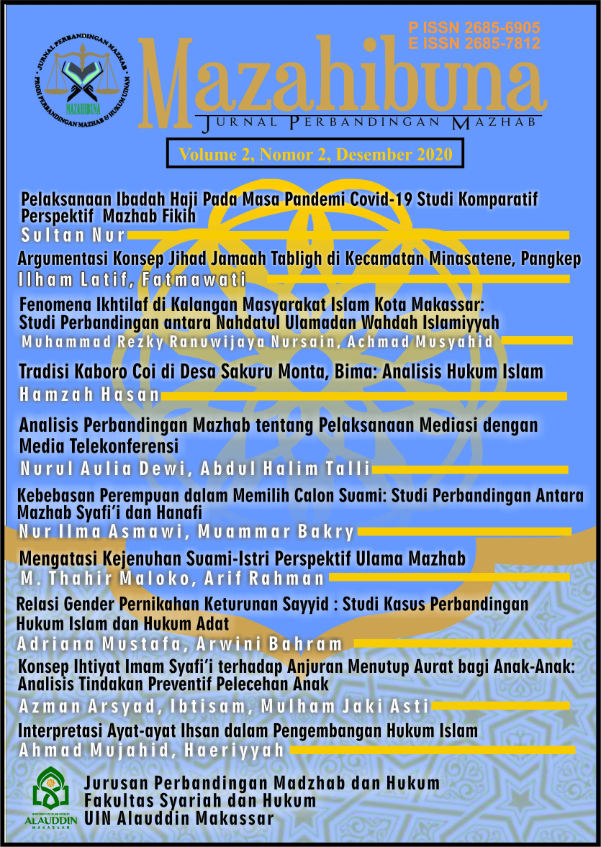Tradisi Kaboro Coi di Desa Sakuru Monta, Bima; Analisis Hukum Islam
Abstract
Kaboro Coi practice was originally just a tradition, but the community has considered it an obligation, not carrying out the cooboro coi will get social sanctions from the community, such as being ostracized and the community no longer cares about any event events (hajatan) conducted by families who do not carry out the Kaboro Coi tradition. Seen from the perspective of Islamic law Kaboro coi practice has a substance that shows the value of togetherness, helping each other to help each other, like the concept of "wata ᾶwanu‘ alal birri wa taqwa ". This study, does not want to see the Kaboro Coi tradition as an act that implies rewards and sins when done and not done, but just want to see why this tradition is important to do.The data used as material for analysis are field data obtained through observation, interviews, and literature studies. This paper confirms that the practice of Kaboro Coi, in the terminology of the Sakuru Monta village community, has become a community practice that aims to facilitate the implementation of the celebration, such as sunna ra ndoso labo nika ra nekuReferences
Kementerian Agama RI., (2012). Al-Qur’an dan Terjemahnya. Bandung: Pt. Syamil Qur’an.
Hamzah, ‘LONDO IHA PADA MASYARAKAT BIMA (Telaah Hukum Pidana Islam)’, Journal of Chemical Information and Modeling, 2013
Asbah, Asbah, ‘UPACARA UA PUA SEBAGAI MEDIA DAKWAH DAN SYIAR ISLAM PADA PENYEBARAN AGAMA ISLAM DI BIMA’, Historis | FKIP UMMat, 2018 <https://doi.org/10.31764/historis.v2i1.195>
Buhori, Buhori, ‘ISLAM DAN TRADISI LOKAL DI NUSANTARA (Telaah Kritis Terhadap Tradisi Pelet Betteng Pada Masyarakat Madura Dalam Perspektif Hukum Islam)’, Al-Maslahah Jurnal Ilmu Syariah, 2017 <https://doi.org/10.24260/almaslahah.v13i2.926>
Fanani, Ahmad, ‘SHALAT JAMAK BAGI DOKTER BEDAH DALAM OPERASI DIPANDANG DARI PERSPEKTIF KAIDAH AL-MASYAQQAAT TAJLIBU TAYSIIR’, Ijtihad : Jurnal Hukum Dan Ekonomi Islam, 2018 <https://doi.org/10.21111/ijtihad.v12i1.2586>
Fawzi, Ramdan, ‘APLIKASI KAIDAH FIKIH العادة محكمة DALAM BIDANG MUAMALAH’, Amwaluna: Jurnal Ekonomi Dan Keuangan Syariah, 2018 <https://doi.org/10.29313/amwaluna.v2i1.3279>
Indrawati, Suci, Edy Herianto, and Dahlan Dahlan, ‘ASPEK PENDIDIKAN NILAI PANCASILA DALAM PERKAWINAN ADAT MBOJO (Studi Di Desa Soro Kecamatan Kempo Kabupaten Dompu)’, Jurnal Pendidikan Sosial Keberagaman, 2019 <https://doi.org/10.29303/juridiksiam.v6i1.89>
Mardani, Mardani, ‘HUKUM ISLAM DALAM SISTEM HUKUM NASIONAL’, Jurnal Hukum & Pembangunan, 2008 <https://doi.org/10.21143/jhp.vol38.no2.170>
Naro, Wahyuddin, Abdul Syatar, Muhammad Majdy Amiruddin, Islamul Haq, Achmad Abubakar, and Chaerul Risal. “Shariah Assessment Toward the Prosecution of Cybercrime in Indonesia.” International Journal of Criminology and Sociology 9 (2020): 572–586. https://doi.org/10.6000/1929-4409.2020.09.5
Nurhayati, Nurhayati, ‘MEMAHAMI KONSEP SYARIAH, FIKIH, HUKUM DAN USHUL FIKIH’, JURNAL HUKUM EKONOMI SYARIAH, 2018 <https://doi.org/10.26618/j-hes.v2i2.1620>
Nurhayati, Nurhayati, and H. Muhammad Yunan, ‘TRADISI TEKA RA NE’E DALAM PROSESI PERKAWINAN ADAT PADA MASYARAKAT DESA BORO DI KECAMATAN SANGGAR KABUPATEN BIMA’, CIVICUS : Pendidikan-Penelitian-Pengabdian Pendidikan Pancasila Dan Kewarganegaraan, 2019 <https://doi.org/10.31764/civicus.v6i1.630>
Sulaiman, Aimie, ‘Memahami Teori Konstruksi Sosial Peter L. Berger’, Society, 4.1 (2016), 15–22 <https://doi.org/10.33019/society.v4i1.32>
Sumardi, Dedy, ‘Islam, Pluralisme Hukum Dan Refleksi Masyarakat Homogen’, Asy-Syir’ah Jurnal Ilmu Syari’ah Dan Hukum, 2016 <https://doi.org/10.14421/asy-syir’ah.2016.502-08>
Suryani, Irma, Dwi Rahariyoso, and Rio Yudha Maulana, ‘NILAI-NILAI YANG TERKANDUNG DALAM TRADISI LISAN BIDUK SAYAK MASYARAKAT DESA JERNIH’, Titian: Jurnal Ilmu Humaniora, 2019 <https://doi.org/10.22437/titian.v3i1.7028>

This work is licensed under a Creative Commons Attribution 4.0 International License.
Authors who publish with Mazahibuna: Jurnal Perbandingan Mazhab agree to the following terms:
- Authors retain copyright and grant the Mazahibuna: Jurnal Perbandingan Mazhab right of first publication with the work simultaneously licensed under Creative Commons Attribution License (CC BY 4.0) that allows others to share the work with an acknowledgment of the work's authorship and initial publication in this journal.
- Authors can enter into separate, additional contractual arrangements for the non-exclusive distribution of the published version of the work (e.g., post it to an institutional repository or edit it in a book), with an acknowledgment of its initial publication in this journal.
- Authors are permitted and encouraged to post their work online (e.g., in institutional repositories or on their website) before and during the submission process, as it can lead to productive exchanges, as well as earlier and greater citation of published work.

